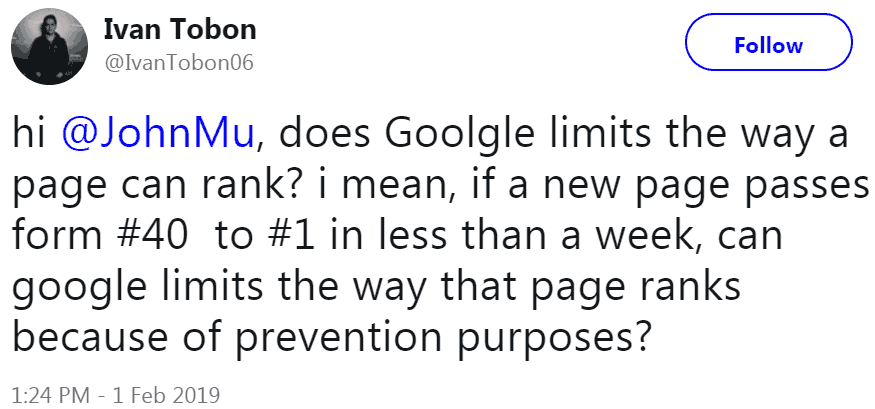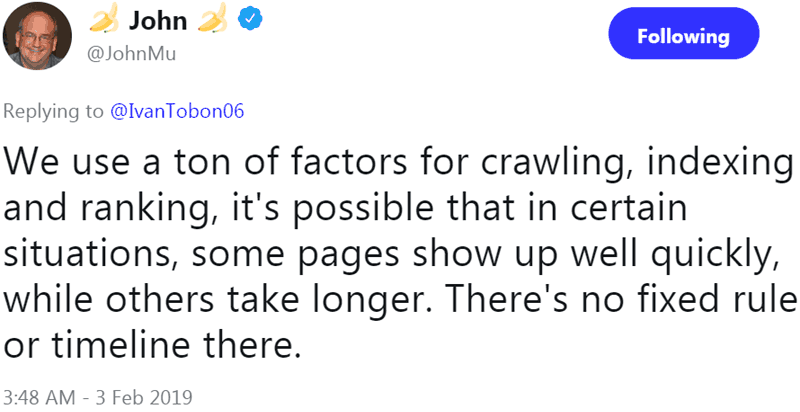Google’s John Mueller was asked on Twitter if there were any limits for a new page ranking in the top of the search results. John Mueller said no, there were no fixed rules. Then he explained why this is the case.
Background of a Ranking Limit on New Sites and Pages
There is a longstanding belief in SEO that Google has an automatic block that prevents new sites or web pages from ranking. This block is referred to by the SEO community as a sandbox. The sandbox “penalty” is commonly believed to apply to new sites.
The reasons why new pages are commonly believed to be disadvantaged from ranking are similar to the reasons why sites are said to be at a disadvantage. A common hypothesis is that Google blocks new pages from ranking if they are on new or younger websites.
The concept of the sandbox began about fifteen years ago. Some publishers noticed that it was increasingly difficult to rank new sites and web pages than it previously was. This was real.
The SEO community created a hypothesis that new sites and pages might be held back from ranking in case they were spammy.
In a related hypothesis, it has been speculated that older sites were able to rank new pages easier because they had more trust (something that was recently addressed by John Mueller).
Google Denies Existence of a Sandbox in 2005
Google has consistently denied that a sandbox on new sites existed for fifteen years. Matt Cutts (formerly head of Web Spam team at Google) stated in 2005 that a sandbox did not exist. Here is what someone who was at the search conference reported what he heard:
“The existence of a new-site “sandbox” (which delays the site being ranked well for months) has been a topic of debate among SEOs.
In reply to a question from Brett Tabke, Matt said that there wasn’t a sandbox, but the algorithm might affect some sites, under some circumstances, in a way that a webmaster would perceive as being sandboxed.”
Someone else who was there commented:
“The part that I thought was interesting was that Matt said when they (Google) first started hearing about the “sandbox” as the term is used by webmasters they had to look at their algo to see what was causing it and then look at the sites it was affecting. Once they studied it, they decided they liked what it was doing.”
One explanation for what happened was that the algorithm was updated to improve how it catches manipulative behavior.
For example, Google announced in May 2005 that they were using statistical analysis to catch spammy link profiles. This kind of analysis would be able to catch many of the manipulative tactics in use at the time.
Fixed Rule on New Pages Ranking Denied
The question asked on Twitter was if there was a limit that Google placed on how new pages ranked:
 A Twitter user asked Google’s John Mueller if there was a limit placed on the ability of new pages to rank, presumably for preventing spam.
A Twitter user asked Google’s John Mueller if there was a limit placed on the ability of new pages to rank, presumably for preventing spam.John Mueller responded:
“We use a ton of factors for crawling, indexing, and ranking, it’s possible that in certain situations, some pages show up well quickly, while others take longer. There’s no fixed rule or timeline there.”
Certain situations in which new pages show up well quickly could be a reference to the topicality of a web page, where a certain topic is trending.
Or it could be that a new page addresses a topic so well that it becomes popular, which in turn might cause Google to begin showing it. Signals of popularity could be links to the site.
What I believe is important is that John Mueller clearly states there is no fixed rule or timeline for the ability of a new page to rank.
The concept of a sandbox has been experiencing a revival. It’s important to understand that the idea that new pages (and by extension new sites) have to “age” in order to be “trusted” before they can rank has been disputed by Google for fifteen years.
John Mueller’s response is the latest of many to confirm that no such rule or timeline exists. Read tweet here.
 Google’s John Mueller confirms there are no rules prohibiting a new page from ranking.
Google’s John Mueller confirms there are no rules prohibiting a new page from ranking.
More Resources
- A Complete Guide to Launching Your New Website
- 5 Critical SEO Considerations When Optimizing News Websites
- A Complete SEO Checklist for Website Owners
Images by Shutterstock, Modified by Author
Screenshots by Author, Modified by Author





